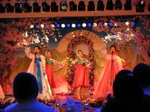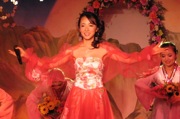Today at a rice porridge restaurant near my apartment Sayaka and I overheard some interesting code-switching going on at the table next to us. A woman was struggling to feed her three children, two of which were being less than cooperative. Sometimes she would speak full sentences in Chinese, but with an accent that at first made me think she was a non-native speaker. I later concluded she was just speaking a dialect close enough to standard Mandarin for us to understand but not of the variety I was most familiar with. She seemed to slur her words in an interesting way and pronounced some syllables differently.
As the meal progressed she began code-switching with her children. One child was significantly older than the others and the mother seemed to speak to her mostly in Korean. However, a number of things such as her pronunciation and the occasional and almost random use of honorifics when speaking to her children indicated that she was less than native in Korean. With her two younger children she freely mixed Chinese and Korean, sometimes speaking several sentences in a row in Korean, then switching to Chinese, especially when barking frustrated commands to her restless children (why didn’t the father join them for their Sunday lunch? She sure could have used the help with the kids). She also freely mixed both languages in the same sentence, such as when she tried to convince her youngest that the spoonful of smoking rice porridge headed for his mouth was not hot, “不热了,먹어요, 不热了,먹어!” The youngest child always responded in Chinese, but perhaps due to his young age struggled with some of the initial consonants, turning Chinese initial consonants like c-, zh-, ch-, q- into t-, d-, t-, t-, respectfully, in a most adorable manner.
One possible background story for this family is that the mother is married to a Korean husband, learning Korean after coming here and starting a family with her new husband. Their marriage would be one of the many “invisible” international marriages in a country which has a fast growing number of Korean males marrying foreigners, especially Chinese and Vietnamese women. As I have mentioned in early postings, given my own background, I feel an intense feeling of identification with these children, no matter what their own unique mix of languages and identities might be. I hope the kids I saw today will be able to keep their Chinese as they grow up in Korea and that the social and educational environment for my young fellow hybrids will allow them to develop to their full potential.

